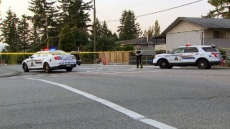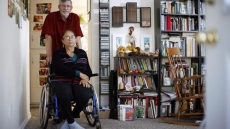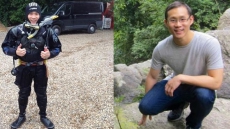MONTREAL — Get ready for the Great Shakeout.
On Thursday, drills in British Columbia and Quebec will provide people with the opportunity to learn how to be safer during earthquakes.
B.C. organizers say 750,000 people have registered for that province's event, which will see participants drop to the ground at 10:15 a.m. local time, take cover by getting under a table or desk and hold on for about 60 to 90 seconds.
The exercise, which happens yearly on the third Thursday in October, was first held in British Columbia in 2011.
Alison Bird, a seismologist with Natural Resources Canada, is urging Canadians to take steps to prepare for an earthquake — not just in southwestern B.C. where there's a high risk — but across the country.
Bird says some groups in Ontario will also be doing the drill, but it is not provincewide.
She stresses the worst thing a person can do is to run through a building when a quake hits.
"When you're in a stressful situation your brain is not functioning properly so your body wants to do the instinctive thing, which is to run," she said, adding that the most dangerous place to be is just around the outside of a building.
Bird says people need to be taught to drop, find cover and hold on if an earthquake hits.
"It's really important to create that muscle memory so that you do the right thing in an earthquake," she said.
Over the centuries, earthquakes in Canada have claimed at least 30 lives, with most of them victims of a tsunami that hit Newfoundland in 1929.
People living on Moresby Island, off the B.C. mainland, have been coping with their share of earthquakes over the years.
Bill Beldessi, the director of Moresby Island regional district, remembers the 2012 quake in the Haida Gwaii region that measured 7.8 on the Richter scale.
"It was probably one of the worst one since I've lived here," he said in an interview from Sandspit, B.C.
"I was in bed and I noticed the light fixtures started making noises and a few things dropped off the wall and then a couple of aftershocks happened within five minutes."
Beldessi, 66, says everyone headed for higher ground.

That threat of massive tidal waves also prompted the community to pull together and set up an emergency centre.
"That's what we're doing right now,'' he said. ''We have a tsunami centre up in the hills and it's full stocked.
"As far as the big one, who knows when it's going to come — we don't lay awake worrying about it.
"We constantly have earth tremors here so it's not a big deal when we get something around three-and-a half or (magnitude) four. It's normal."
Bird says people living in Victoria have a one-in-three chance of experiencing a damaging earthquake over the next 50 years.
For Vancouver, there's a one-in-five chance.
The danger is lower in the B.C. Interior, but Bird cautions ''there's nowhere that has zero hazard for earthquakes."
The hazard decreases further inland and while provinces like Saskatchewan and Manitoba can experience quakes, the threat there is low.
Bird says there are approximately 4,000 earthquakes a year in the West and about another 2,000 in the East.
"So it's a very active country for earthquakes. . . we really have to try to get people to recognize that that's the case."
Her colleague, Maurice Lamontagne, who monitors Eastern Canada, says there are three active seismic zones in Quebec.
He says 60 earthquakes are registered yearly in the west Quebec region, which includes the Laurentians, Montreal, Ottawa and eastern Ontario.
Another seismic zone is the Charlevoix region northeast of Quebec City where two children died in an 1866 quake.
The third seismic zone in Quebec is the Lower St-Lawrence region and Lamontagne says it's mainly under the river that the 60 yearly quakes are produced.
The seismologist adds that neighbouring New Brunswick has had its share of quakes and continues to register small ones.
Lamontagne warns there could be a repeat of the 7.2 earthquake off the Grand Banks of Newfoundland that was followed by a tsunami. It killed 28 people as waves carried away several villages in the Burin Peninsula.

"Absolutely!, there could be earthquakes that could cause tsunamis like that one," he said in an interview.





